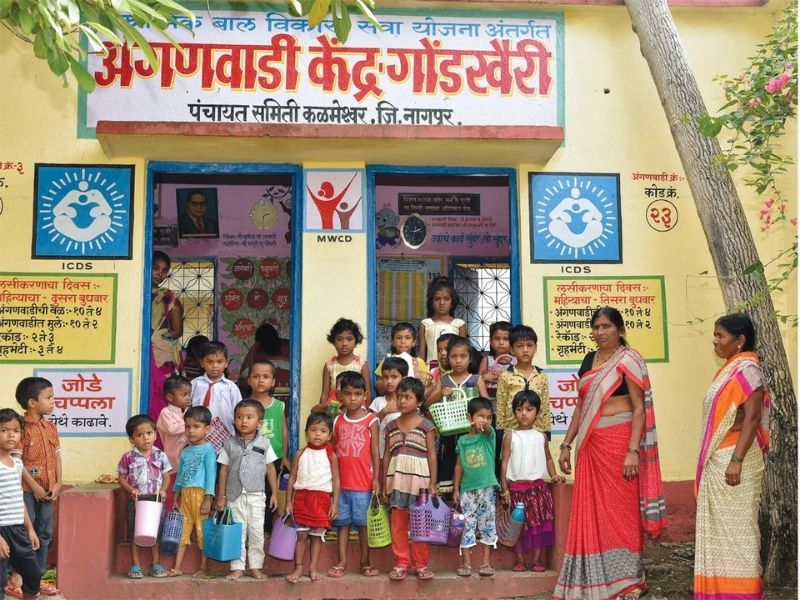Delhi: Anganwadis silver lining

Following a prolonged and sustained campaign by EducationWorld, which staged its first international conference on early childhood care and education (ECCE) in 2010 and has been since rating, ranking and awarding the best private pre-primary schools and government-run anganwadi centres in major cities countrywide, the critical importance of ECCE was acknowledged by the high powered K. Kasturirangan Committee (2019) and given official acknowledgement and high importance in the National Education Policy (NEP) 2020.
NEP 2020 acknowledges that every child has a right to attain foundational literacy and numeracy by age eight, and has restructured the country’s century-old 10+2 school education system to a new 5+3+3+4 pre-primary to class XII system that formally incorporates ECCE into K-12 education. Unfortunately, NEP was formally presented to the nation on July 29, 2020 when the novel Coronavirus aka Covid-19 pandemic was sweeping the country and all education institutions including preprimaries were under strict lockdown since March 25, 2020.
Since then NEP 2020 has gone off the national radar. Worse, youngest children in the country’s 1.38 million anganwadi centres (AWCs) — essentially nutritional centres for new-borns and lactating mothers — established under the Central government’s Integrated Child Development Scheme (perhaps the late prime minister Indira Gandhi’s greatest contribution to national development), have arguably suffered most by way of learning loss and socio-emotional damage. AWCs countrywide that provide a modicum of ECCE, parsimoniously host 90 million children and are also obliged to provide free-of-charge mid-day meals — the world’s largest child nutrition programme.
However the silver lining is that on recommendation of Parliament’s Standing Committee on education, women, children, youth and sports, the Delhi-based NCERT (National Council for Educational Research & Training) in consultation with the Union ministry of women & child development and National Institute of Public Cooperation and Child Development, is in the final stages of drawing up a national curriculum for children in the 3-6 age group.
NCERT’s new ECCE curriculum delhi Education News is being designed to enable smooth transition of two-three-year-olds in primary classes under the 5+3+3+4 format prescribed in NEP 2020. But with the country’s 60,000 private preschools and 1.38 million AWCs under lockdown for 70 weeks and counting, picking up the pieces and momentum by way of trained teachers and providing necessary ECCE infrastructure, is likely to prove a formidable challenge.
“Talking about youngest children and impact of the Covid-19 pandemic on them, in a way their whole childhood has been lost and they have suffered deep psycho-social damage. Denied all-important literacy and numeracy skills for almost two years, youngest children are perhaps the most deprived section of society. The challenge that the prolonged lockdown of AWCs for almost 70 weeks poses to schools and teachers is humungous. Teaching children admitted in classes I-III will be a serious difficulty for teachers as they are not trained to teach foundational literacy. Mildly put, there will be chaos when schools reopen fully,” predicts Dr. Geeta Menon, former professor at Centre for Early Childhood Development and Research of Jamia Millia Islamia University, Delhi.
Moreover according to ECCE experts, merging AWCs with schools as proposed in NEP 2020 is likely to pose its own challenges. AWCs are essentially community centres to which mothers and other community workers have free access and the environment is informal. Schools on the other hand are formal institutions. Therefore, AWCs within schools will need to function as autonomous structures with their own teacher cadres. This is likely to prove a long haul.
Meanwhile to India’s Central and state governments given to shutting down and reopening schools according to their whims, Unicef has given unambiguous advice to invest in teachers and infrastructure. But the AWC in Maharashtra: formidable challenges january 2022 educationworld 13 Puja Awasthi (Lucknow) DPS Mihan 14 educationworld january 2022 bottom-line is reopening of AWCs and primary schools which should be prioritised. “This is critical investment we need to make for children as the region (South Asia) gears up for future waves of Covid-19. We need to build systems which can weather any storm and keep children learning, no matter the circumstances,” says a Unicef statement.
This is especially true of AWCs which despite their seemingly large number (1.38 million) accommodate only 50 percent of India’s 164 million children below five years age.
Also Read: Delhi: Deferred price

















Add comment